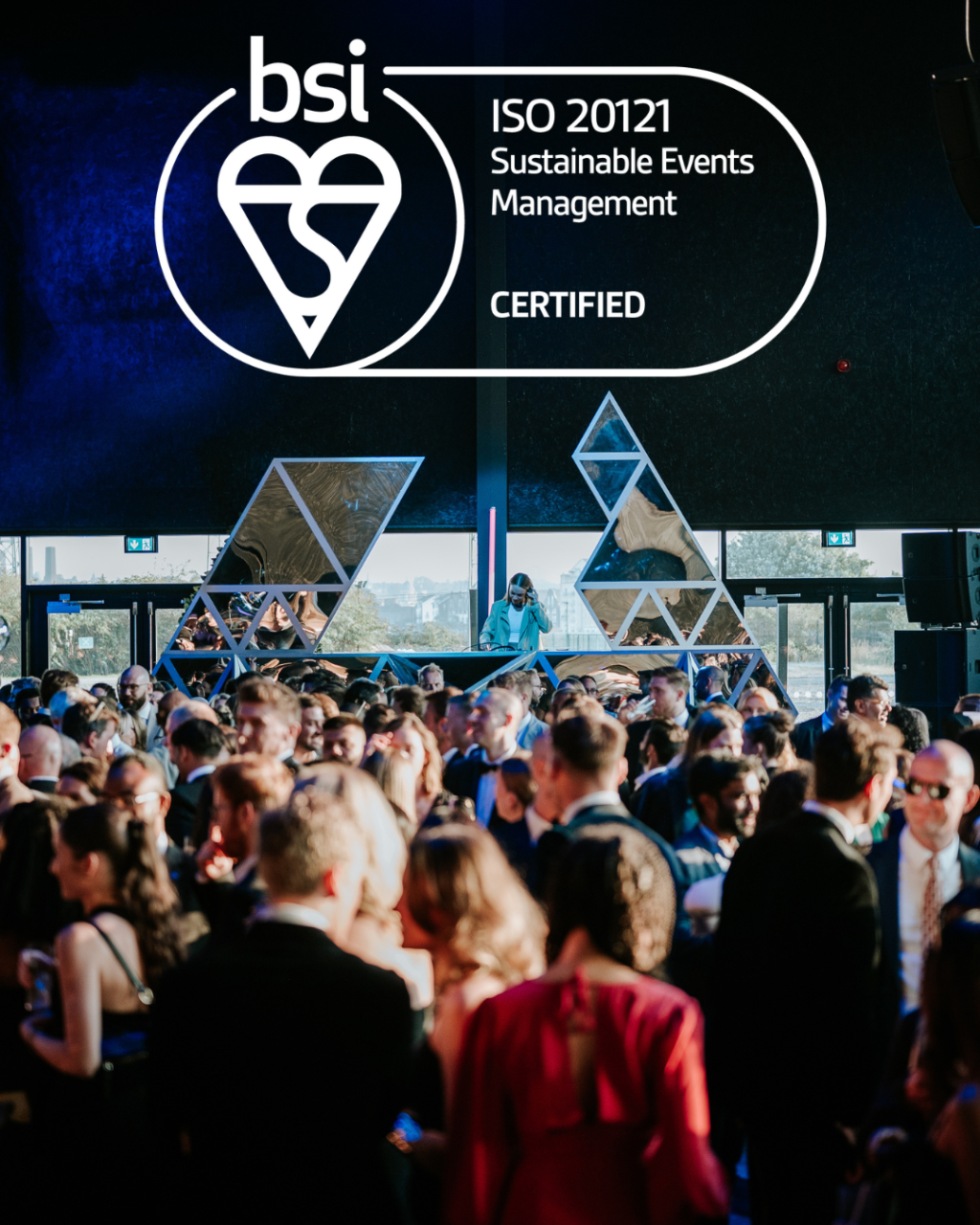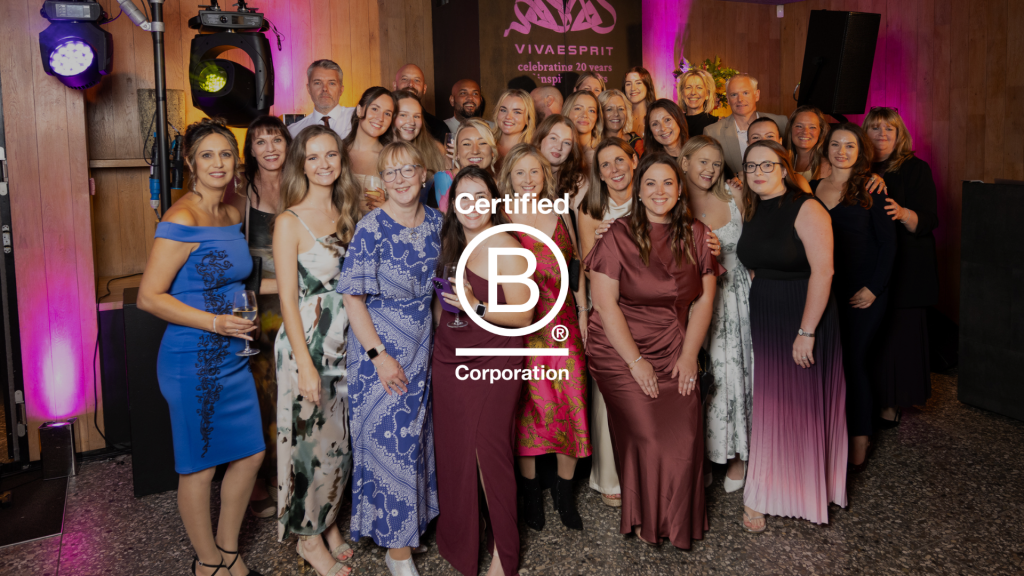The events sector is challenged to reduce carbon emissions by 50% by 2030. We’re working hard to do our part. Here’s how you can do yours…
As we continue to see the impact of climate change around the world, sustainability is not just a consideration for event organisers, it’s a necessity. The UK government has set a strategy to become ‘net zero’ by 2050 and the governing body for events has challenged the sector to reduce carbon emissions by 50% by 2030. Viva Esprit have embraced the challenge with both hands. We not only measure our own impact, we measure the impact of each event that we support, and it’s giving us strong insights that allow us to provide relevant and realistic advice to our clients.
Nadine Fenton, Managing Director , Viva Esprit explains “Sustainability is not about compromise. We work with clients to create unforgettable experiences for their guests that are also mindfully sustainable.”
Small changes can make a huge impact. For all of our clients we encourage reusing and recycling wherever possible, implementing a ‘digital first’ approach to delegate communications via apps rather than printing, and sustainable travel. But implementing sustainable strategies for your events doesn’t create a ‘fun vacuum’. In fact, it can be quite the opposite. We’ve introduced lots of fun touches along the way, such as using seeded paper for name badges that can be planted to support biodiversity, or sourcing the finest local foods for a gala dinner menu in Edinburgh.
As Andrew Perolls, CEO at event sustainability measurement company Greengage, says: “I would say that, if anything, making an event sustainable enables businesses to be a bit more creative with doing things differently.”
That’s why we’ve pulled together this checklist for sustainable event planning, to get the creative juices flowing.
Sustainable event checklist
Waste reduction
1. Eliminate single-use plastics
Many other areas of sustainability are harder to achieve, but creating a ‘single-use plastic-free event’ is very achievable for most events. Avoid using plastic bottles, choose caterers and suppliers that are willing to go plastic free, and use sustainable, reusable or recycled alternatives instead of commonly plastic items at events.
2. Avoid unnecessary items
Gone are the days when attendance at an event was judged by the haul of goodies you left with. Many organisations and individuals are now just as conscious about sustainability as your business, and don’t necessarily welcome all of the extra ‘nice to haves’ that we’re used to seeing at events. Removing lanyards, goody-bags and giveaways can significantly reduce waste.
3. Go paper-free
Utilising an event app can significantly reduce the need for any paper at events. Apps replace the need for paper programmes or brochures, not just for the event organisers, but in the case of conferences, also for exhibitors, who can upload information into the app, rather than having paper at their stall. Apps provide a single source for all information and are extremely useful for participants, supporting networking opportunities and scheduling too.
4. Factor in food waste
With the importance of ensuring your guests are well fed, it’s tempting to over cater. Event experts will be able to provide independent advice on sensible catering volume for your event, and while you should never have a situation where you run out of food, there are some practices you can put into place to limit food waste. One of these is to ensure nothing leaves the kitchen too early. Once food has left the kitchen, it can’t be eaten by staff or donated locally due to food standards. Staggering servings will ensure that there is plenty of food to go around, while ensuring that nothing is left sitting out getting stale.
Carbon footprint
5. Consider the carbon footprint of food
Vegan menus typically have a considerably lower carbon footprint than meat-based menus, because every animal requires significantly more vegetation to sustain life beforehand and water used to grow the crops and transportation etc. There have been great improvements over the past few years in meat-replacements and vegan cuisine meaning that your guests will not only enjoy the vegan alternatives, they might not even notice the difference. Meanwhile, with a growing vegan population and increasingly conscious audience, vegan food ensures inclusivity. Consider also using local providers and produce to further reduce the carbon footprint of your catering.
6. Consider hybrid and/or virtual events
We understand the very real human desire for face-to-face interaction and this remains an undeniable preference for most organisations. At the same time, virtual events have become increasingly engaging and hybrid events provide a great compromise that can reduce the need for travel when you have international participants. Hybrid and virtual events tend to be more accessible, lower carbon, lower waste and more affordable, so they present a great option for businesses looking for a socially responsible and cost-effective event model.
7. Choose sustainable venues and locations
Because travel is the largest contributor to carbon release, location and venue selection are key to reducing events’ impact on the environment. You want to make sure that the location is the most efficient in terms of travel and to do this you’ll have to first assess where people are coming from. If there is an even spread of people coming from different locations, select a location in the middle. If there is a majority coming from one region, select a location nearer that group of people. Then you’re ready to source a venue. Look for venues that have policies on energy efficiency, waste reduction, recycling programs, and sustainable transportation options, being close to public transportation, for example.
8. Provide sustainable travel options
Where public transport isn’t available, informing attendees about sustainable travel options (such as highlighting bike routes to the venue) or providing coaches to minimise car traffic to the venue can reduce environmental impact. It can even be a feature of the event, by hiring a ‘London bus’, for example, or incorporating a guided tour on the way to the location.
9. Go carbon-neutral with carbon offsetting
Carbon offsetting allows you to balance out the carbon production of your event, with actions that reduce carbon in the atmosphere. Carbon offsetting companies implement practices such as tree planting, investment in renewable energy projects and methane capture to keep our air and environment clean. Carbon offsetting is an investment that is growing in the events sector, with many opting to carbon offset as an alternative to giveaways, or to counter the effects of travelling to far-off locations. But in order to offset, you have to first measure the carbon your event is producing. We use EventSmart to measure the sustainability of every event that we support, once you have this measurement, you’ll be able to offset the correct amount to make your event carbon neutral.
Corporate Social Responsibility
10. Give back to the local community
Events have a significant positive impact on the local area, through job creation and boosting the economy, but they can negatively impact their environment too. This provides an opportunity for event organisers to consider how to give back to the community, while providing the chance for guests to do something positive (and fun) too. Research community volunteering opportunities in the area and consider how it ties into your event.
11. Speak to the experts
Viva Esprit work with Greengage to implement sustainability measurement for each of the events we work on. As our knowledge and insights grow, we’re able to provide tailored advice on the most appropriate sustainability measures for our clients. It’s important that your event matches your business's standards. We work with our clients to find the right balance.
Sustainability is now in the top three considerations for travel and event buyers, and the events industry has one of the most influential opportunities to open minds to change.
Viva Esprit deliver inspiring events and unforgettable experiences around the world that create a lasting impression. If you’re looking to make a positive sustainable impact with your event, we can help. Get in touch.






